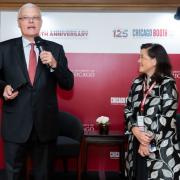For much of her distinguished career, Prof. Elizabeth Wallace centered her academic interests around France—and French history, literature and culture.
One of the first women to attain the rank of professor at UChicago, Wallace taught French and Spanish literature, volunteered as an interpreter in France during World Wars I and II, and enjoyed friendships with French intellectuals and American writers Edith Wharton and Mark Twain. Wallace was also an early catalyst for UChicago’s global ambitions: Only ten years after the University’s founding, she spent time in Paris laying the groundwork for what would become UChicago’s study abroad program.
Wallace’s lifelong engagement with France and French institutions mirrors UChicago’s long history of global engagement, which most recently culminated in the 2024 opening of the new John W. Boyer Center in Paris. Take a look back at her impactful career:
Wallace began her studies in France in the Latin Quarter of Paris in 1896. Wallace writes in her autobiography The Unending Journey about working to save her francs for trips to the Comédie Française, participating in intellectual discussions with fellow students at the local brasserie, and attending classes in the dark classrooms of the old Sorbonne. She also writes of the beauty of Parisian life:
The sun was shining gloriously after the night of rain, shop windows were opened wide and invitingly, the autumn leaves were falling with slow, reluctant grace from the trees in the Tuileries gardens; the quick-flowing waters of the Seine were sparkling. Far down to the left the noble towers of Notre Dame were silhouetted against the blue sky. Cabs crossed each other with dangerous facility, alert cabbies flicked their bony horses with snappy flourishes, flower stands perfumed the air.
Born in 1865 to a family of Protestant missionaries in Bogotá, Columbia, Wallace was bilingual in English and Spanish by the age of 4. Her family moved to the United States several years later. She attended Wellesley College, where she learned French, Italian, German and even some Latin. Her connection to the University of Chicago began when she did some graduate work at the University of Minnesota with future UChicago President Henry Pratt Judson. He encouraged Wallace to apply for a graduate fellowship in Latin American history at UChicago, which she joined in 1892—the year classes began at the University.
In 1900, UChicago’s first President, William Rainey Harper, asked Wallace to return to Paris to explore the potential of study abroad opportunities for students. In her autobiography, Wallace quoted Harper as telling her: “I want you to plan to spend next year in France. It would be an excellent plan to take a group of young women there, supervise their studies, which would be University courses, but followed in the French language, and they would receive University credit not only for the subjects themselves, but for French thus acquired.”
Although this idea was not immediately successful, the seeds of what eventually became UChicago’s presence in Paris were sown. Prof. John W. Boyer said: “I do remember reading Wallace’s autobiography, citing her failed effort to create a Chicago study abroad program in Paris as one reason (among many others) for us to ‘try again’ to develop a major educational initiative in Paris in our time. I think that she would be extremely proud of our new Center in Paris, created nearly 125 years after her first efforts.”
Wallace worked as a professor of French and Spanish literature at UChicago for over 30 years, where her class on Molière was especially popular. In 1923, Wallace and two others became the first women to attain the rank of full professor at UChicago, and she became a passionate advocate for equality in education. “Wallace devoted her career to the study of European culture and she was a much admired and very gifted teacher of French literature and history,” Boyer said.
Wallace remained at the heart of academic and literary life in Paris during her many studies abroad. Her time spent at the Sorbonne, Collège de France, and her eventual postgraduate fellowship at l’École des Hautes Études put her in contact with many leading French intellectuals with whom she formed friendships that lasted throughout her life. Such luminaries as Émile Zola, Edmond Rostand, Edith Wharton, and Gaston Paris all made her acquaintance. Wallace even engaged in a friendship with Mark Twain during the final years of his life, which she chronicled in her book Mark Twain and the Happy Island.
On reading a letter from Twain to herself:
...I can see vividly the expressive and beautiful face of America’s beloved jester. I hear again that voice with its many intonations and its quaint, inimitable drawl, and I live again the short, but to me, exquisite friendship that now seems to stand in a little frame by itself, cut off from every other experience.
Wallace worked as an interpreter in World War I, where she focused on the battle against tuberculosis. She describes her role as interpreter: “I often felt as though I had completely lost my own identity. I was an actor seeking to grab two personalities at once and obliged to make lightning changes of points of view.” In 1946, Wallace was inducted into the French Legion of Honor for her relief work in France during both world wars.
Wallace left her mark on UChicago in many ways, including as a dean in the College and as head of one of the first dormitories for women. Her name is represented on the UChicago campus with the Wallace House at Max Palevsky Residential Commons.
As a testament to her profound impact, in May 1955, President and Chancellor Robert Hutchins sent Wallace a telegram for her 90th birthday. It read: “We send our love to Elizabeth Wallace, who has enriched and illuminated the University of Chicago and the lives of all her friends.”

